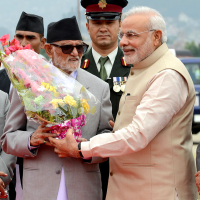Modi Wows Nepal
 Prime Minister Narendra Modi being welcomed by his Nepalese counterpart, Sushil Koirala, at Kathmandu airport (photo: PTI)
Prime Minister Narendra Modi being welcomed by his Nepalese counterpart, Sushil Koirala, at Kathmandu airport (photo: PTI)
Prime Minister Narendra Modi more than made up for the 17 years that Nepal had not seen an Indian prime minister on a bilateral visit. He has re-energised ties with his landmark two-day visit – addressing the country’s Constituent Assembly, providing Rs. 10,000 crore ($1.67 billion) in concessional loans to help build power plants and roads, and offering his Nepali counterpart a free hand to renegotiate the 1950 partnership treaty between the two neighbours.
Modi has in two days succeeded in bringing Indo-Nepal ties back to the forefront of India’s regional diplomacy, overturning a decade of moribund ties under the previous UPA administration. He achieved a rare success by winning over all disparate elements in Nepal – the traditional political parties, the Maoists, and Madeshi leaders – who are often at loggerheads over the future direction of Nepal.
The Indian prime minister won the hearts of the Nepalese people when he made his opening remarks to the Constituent Assembly in the Nepali language. He said he was “overjoyed to be in Nepal” where he had first come as a “pilgrim” many years ago, and that he felt “very privileged and honoured” to be the first guest to be invited to address the House.
"Nepal needs highways, information ways and transmission ways. India will support you in all these," Modi told Nepal’s lawmakers.
"Nepal can use this on hydropower and infrastructure projects of its choice," he said to thunderous applause in a parliament chamber where politicians in the past have often criticized India as a "big brother". This time, however, Nepal’s power elite could not stop gushing about Modi’s speech, according to Hindustan Times.
Khimlal Devkota of the Maoists said Modi had cleared all the ‘confusion’ about India’s intentions; a top Madhesi leader said, “The ball now is in Nepal’s court to build this relationship”; and a Nepal Army general called the speech ‘absolutely magnetic’.
Meanwhile, Baburam Bhattarai, Maoist ideologue and former PM, tweeted that Modi had won the ‘hearts and minds’ of the Nepalese people with his ‘magical address’.
Since becoming prime minister in May, Modi has reached out to India’s neighbours in a foreign policy push that advisers say is key to his plans to make India a military and economic power, according to Reuters.
Indian and Nepali negotiators are working on a power pact aimed at harnessing Nepal's estimated 42,000 MW hydroelectric potential to meet domestic needs as well as supply India's energy-hungry economy.
The Himalayan nation currently has an installed capacity of a mere 600 MW because its development has been held back by years of political instability. It is still struggling with the transition to a constitutional republic after the abolition of the monarchy in 2008.
Nepal's politicians are at odds over the proposed energy pact. Opponents say it would give Indian firms a stranglehold over Nepal's energy resources and bar other countries, such as China, from investment in the sector.
Modi sought to allay those concerns. "Nepal can become a prosperous nation by selling electricity to India. We want to join you in your journey to prosperity," he declared in his speech.
On Monday, the Indian prime minister offered special prayers at Lord Pashupatinath temple, a holy Hindu landmark in Kathmandu, emphasising the religious bond between India and majority-Hindu Nepal.
“Nepal-India relations are as old as the Himalayas and the Ganga,” Modi pointed out on Sunday. They are now on an upswing thanks to the first visit to Nepal by an Indian prime minister in the 21st century.
- Top Stories
- Controversies
- Where is the Money Going?
- India and the World
- Appointments and Resignations
- Unusual News
- Latest News
- India College Chain’s Expansion into U.S. Draws Opposition from Massachusetts Officials over Quality of Education
- Milk Shortages in India Tied to Release of New Movies Featuring Nation’s Favorite Stars
- Confusion Swirls around Kashmir Newspaper Ban in Wake of Violent Street Protests
- Polio-Free for 5 Years, India Launches Vaccine Drive after Polio Strain Discovery
- New Aviation Policy Could Increase Service, Lower Ticket Prices






Comments